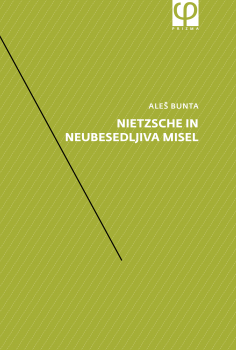Nietzsche in neubesedljiva misel
Nietzsche in neubesedljiva misel ('Nietzsche and the Unspeakable Thought') is Aleš Bunta’s second book on the philosophy of Friedrich Nietzsche, after Uničiti nič? ('To Annihilate Nothing?', 2007). The motif of the unspeakable thought in Nietzsche’s work is usually associated with the theme of the “eternal recurrence”. In Bunta’s study, too, the eternal return takes centre stage, but gradually. In the first chapter, the study first discusses the motif of the unspeakable as such and in relation to the fundamental incongruity of language and becoming. In the second chapter, it looks at Nietzsche’s unusual presentation of the eternal return in Thus Spoke Zarathustra, which is supposed to speak of the eternal return, but which does not speak of it in the usual sense at all. It is only in the third chapter that the discussion focuses on Nietzsche’s original unpublished derivations of the eternal return and explains the ontological, epistemological and psychological dimensions of the doctrine. Chapter 4 is devoted to another key Nietzschean theme, the critique of objectivity, through which the discussion returns in Chapter 5 to the topics of silence and the ineffable, but this time in the context of the problem of a philosophical act.
Downloads

Series
License

This work is licensed under a Creative Commons Attribution-NonCommercial-NoDerivatives 4.0 International License.
